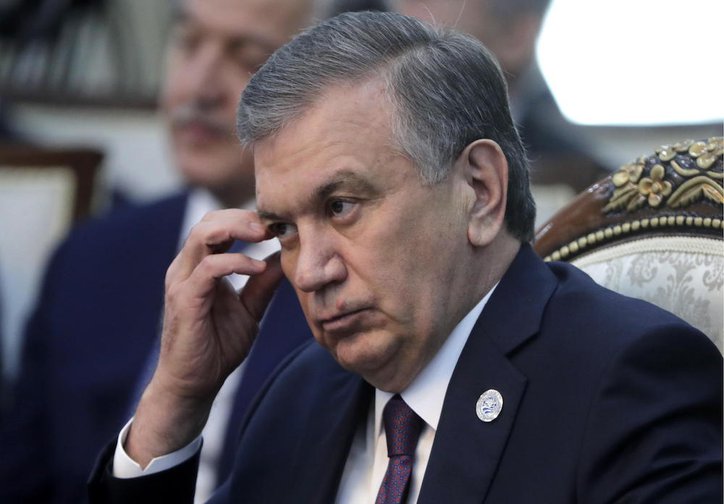New research shows that eight Scottish shell companies hold sizeable commercial interests in an Uzbek business conglomerate linked to the country’s president

On the ground floor of one of Southside Glasgow’s trademark sandstone tenements, opposite a 1970s parade of discount supermarkets and real estate offices, is the official headquarters of a firm called Yardrock Development.
The modest address, a branch of corporate services giant Mailboxes Etc, may not scream “millions”. Yet that is exactly what this business has – at least on paper.
A new investigation has revealed that Yardrock Development is a major investor in a conglomerate linked to the family of Uzbek president Shavkat Mirziyoyev.
The firm, according to filings made at Uzbekistan’s corporate registry, has an equity stake of nearly $21m in Orient Group, a booming network of companies fronted by a member of Mirziyoyev’s extended family.
There is no way of knowing who ultimately owns or controls Yardrock Development – and therefore a chunk of Orient Group.
The Glasgow firm is a Scottish limited partnership or SLP, a kind of business structure described by anti-corruption group Transparency International as “the UK’s home-grown secrecy vehicle”.
Yardrock Development is not the only firm of its kind to invest in Orient Group, which has substantial interests in Uzbekistan’s banking, freight, agriculture, manufacturing, retail and real estate sectors.
In a report published this month, UzInvestigations, a group led by Professor Kristian Lasslett of Ulster University and supported by the Uzbek Forum for Human Rights, found that eight SLPs, including Yardrock Development, owned a total of more than $128m worth of equity in Orient Group companies.
This represents a substantial shareholding in the conglomerate, which has reportedly thrived since Mirziyoyev replaced his predecessor, Soviet-era hardman Islam Karimov, after the latter’s death in 2016. UzInvestigations said the Orient Group had risen in prominence with the support of the Uzbek state.
One of Orient Group’s founders and shareholders is Oybek Umarov, a brother of Otabek Umarov, deputy head of the Presidential Security Service and Mirziyoyev’s son-in-law, UzInvestigations said. Another senior executive, it added, is the son of a serving minister.
This, concludes UzInvestigations, means Orient Group is “politically exposed”. That, the report’s authors stress, does not imply any wrongdoing. But it should, they argue, suggest a need for greater transparency, including over its ultimate beneficial ownership.
There is nothing in the report that links any of the eight SLPs that hold equity in the group with either of the Umarov brothers or any official or politician in Uzbekistan.
“As more wealth accumulates in the hands of those close to senior state officials, the link between extreme economic and political power becomes stronger. This is a significant threat to any prospect of democratisation in Uzbekistan”
Lasslett and his team have gathered details of investments from state railways and a sovereign wealth fund, Uzbek Oman Investment Company or UOIC.
They found that some 86% of investments made by UOIC – which is owned by the governments of Uzbekistan and Oman – have gone to projects involving Orient Group.
“The facts we uncovered gave rise to an initial hypothesis that the Orient Group was the beneficiary of political favouritism which was potentially anti-competitive in nature,” Lasslett said.
“When we attempted to dissuade ourselves of this preliminary conclusion by requesting basic tender documents or information that might explain the significant custom given to the Orient Group, we received nothing of any substance from the government or the companies involved,” he continued.
Umida Niyazova, director of the Uzbek Forum for Human Rights, echoed Lasslett’s concerns. “As more wealth accumulates in the hands of those close to senior state officials, the link between extreme economic and political power becomes stronger,” she said, adding: “This is a significant threat to any prospect of democratisation in Uzbekistan.”
Neither Orient Group nor UOIC responded to requests for comment.

UzInvestigations called on the Uzbek authorities to investigate public money going to Orient Group and recommended wholesale reforms to improve transparency in both corporate structures and government procurement.
But researchers also called on UK regulators to look at the SLPs it named in its report, including Yardrock Development, “to determine whether these legal entities have complied with UK partnership and financial laws/regulations”.
It added: “These recommendations are not intended to imply unlawful activity has taken place. They are premised on the serious risk factors identified in this study, which it is argued warrant further substantive inquiry from the relevant mandated authorities.”
For years, opaquely owned Scottish partnerships have been significant players in Uzbekistan, investing in everything from cotton and steel industries to the controversial wholesale redevelopment of the country’s capital, Tashkent.
Several SLPs have been blacklisted by the UN Development Programme and the World Bank amid concerns about public procurement regarding aid programmes in Uzbekistan.
One SLP linked to a playboy nephew of former Uzbek president Islam Karimov, Akbar Abdullayev, was the centre of a violent turf war over ownership of two hotels in Riga, the capital of Latvia.
Embarrassed by such stories, in 2017 the British Government imposed new rules under which SLPs, like limited companies, have to name a beneficial owner or “person of significant control” (PSC), provided they had one. Critics suggested these measures would be easily bypassed.

The current administration of Prime Minister Boris Johnson has outlined plans for further reforms of SLPs – and wider UK partnership law – and promised to beef up the investigatory capacity of Companies House, Britain’s corporate registry.
Alison Thewliss, the SNP MP for Glasgow Central, has long been critical of the pace and scope of SLP reform. She said the latest revelations from Lasslett’s team showed the structures were still being used to conceal ownership.
“UzInvestigations have gone to great lengths to uncover a lack of transparency and accountability in the business dealings of the Orient Group,” she told openDemocracy.
“Yet again, we see financial vehicles in the UK being the weapons of choice to obfuscate records of ownership and to undermine fair competition.
“Only recently the UK government reaffirmed its commitment to driving greater beneficial ownership transparency, but in truth it has known about the inadequacy of its company registration apparatus for years, and continues to turn a blind eye to illicit activity happening on its doorstep.”
For Ben Cowdock, lead investigator at Transparency International, this is a familiar story.
“It is concerning to see SLPs continue to be used to mask investment into high corruption risk projects,” he said.
“Unfortunately this will continue to be the case until the UK government follows through on its plans to reform Companies House and formation agents here are stopped from offering secrecy packages.”
Cowdock added: “Not only does this situation leave the people of Uzbekistan in the dark on who is truly behind important projects in their country, it also tarnishes Britain’s reputation as a transparent and reliable place to do business.”
A spokesperson for the Department of Business, Energy and Industrial Strategy, which is responsible for corporate reform, said: “The misuse of SLPs by those with criminal intent is appalling. We have announced plans to reform the law on limited partnerships, but we want to go further by reforming the powers of Companies House to give it a bigger role in tackling economic crime.”
“Since tightening regulations in 2017, new registrations of SLPs have fallen by 80% – but we intend to stamp out misuse altogether.”
Under those 2017 tweaks, Yardrock Development had to name a beneficial owner or PSC. It duly did so. Its owner, the firm said, was a newly created SLP called Wallbridge Logistics, now registered, as it happens, in the same sandstone tenement as its subsidiary in Southside Glasgow. And who owns Wallbridge Logistics? According to the company’s public filings, it does not have a PSC.
OpenDemocracy by David Leask